 ICRH Global Newsletter ICRH Global Newsletter 7th of May, 2018 |
Message from the Chair
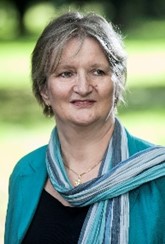 The World Health Day is a global health awareness day celebrated every year on 7 April, under the sponsorship of the World Health Organization, as well as other related organisations. Environment, peace, health, immunization, gender, SRHR... are all subjects of universal concern to the people of this world, and so is universal health coverage, this year’s World Health Day theme. ICRH, a WHO collaborating centre on sexual and reproductive health is a strong partner of the global SDG community striving towards more health, rights, equity and agency for women and children. The World Health Day is a global health awareness day celebrated every year on 7 April, under the sponsorship of the World Health Organization, as well as other related organisations. Environment, peace, health, immunization, gender, SRHR... are all subjects of universal concern to the people of this world, and so is universal health coverage, this year’s World Health Day theme. ICRH, a WHO collaborating centre on sexual and reproductive health is a strong partner of the global SDG community striving towards more health, rights, equity and agency for women and children.
The countdown to the 25th Anniversary of the International Conference on Population and Development (ICPD) starts now, and ICRH is happy to contribute to the progress made towards SRHR with the ANSER network. In addition, ICRH Kenya plays a leading role in FP2020, and specifically in the performance monitoring of family planning uptake in Kenya.
To achieve the ambitions of the Sustainable Development Goals (SDGs) by 2030, working together we can make a huge difference and transform our world for the better. Proud to present an overview of the many activities, publications, and research outputs, and in particular a great advocacy tool to promote the involvement of men in pregnancy and childbirth. Congratulations to the teams! |
| PROJECTS |
ICRHK trains 67 health workers on data access and use
ICRH Kenya, the lead implementer of PMA2020/Kenya (Performance, Monitoring and Accountability within FP2020) project, held two consecutive data use workshops for health workers in April 2018.
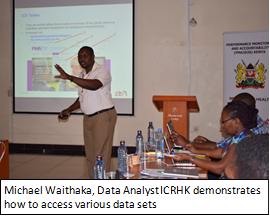 The first workshop was at Maanzoni Lodge, Machakos County and the second one at StarBuck’S Hotel, Uasin Gishu County. The first workshop was at Maanzoni Lodge, Machakos County and the second one at StarBuck’S Hotel, Uasin Gishu County.
The workshops exposed the participants to PMA2020/Kenya data lab and gave them a better understanding of PMA2020/Kenya data, and how it relates with other existing data in informing health policies and programs. Additionally, the workshops provided the health workers, drawn from key partner non- governmental organizations, national government and county governments, an opportunity for hands on exercise in handling of PMA2020/Kenya data available online.
Notably, the participants got a chance to compare and contrast PMA2020/Kenya family planning data and family planning data from Kenya Health Information System (DHIS2) as well as obtain a better understanding of what the key family planning issues are for key stakeholders in Kenya.
Mr. Caleb Ikutu, County Health Records and Information Manager, Nandi County, Kenya said: ‘The PMA2020/Kenya data use workshop was really timely as I enjoyed the discovery of vital and important resourceful sources of family planning data for use in informing policy in my county’.
His sentiments were echoed by Mr. Lopar Samuel, Chief Nursing Officer, West Pokot County, Kenya who shared that they were going to use the data from PMA2020/Kenya as evidence to push for family planning funding from the county government.
ICRHK aims to increase PMA2020/Kenya data awareness among county data leads, Ministry of Health data officers, and key family planning partners through regular data use and dissemination workshops to guide them in informing policies and programs.
More information: www.pma2020.org/program-countries/kenya |
Men and pregnancy
A ‘participative video’ on the role of men during pregnancy and childbirth.
Anna Galle, a doctoral student from Ghent University, investigates the role of men during pregnancy and childbirth in Mozambique. With the support of the UGent ‘Marleen Temmerman Fund’, she made a short film about the role of men in pregnancy and childbirth in Mozambique. During two weeks, ten men from a rural village took part in a workshop of HOPEM and discussed how men can take up a more positive and active role during pregnancy and childbirth. The result is a 'participatory action' video, for which the participating men have defined the message and script. Both a short version (10min) and trailer are available on the project website: http://www.fathersengage.com. The full version of the film (30min) will be used as part of an intervention to involve men during pregnancy and childbirth. Only after the evaluation of this intervention the full version will be available online. The short version will be used both in Belgium and Mozambique to raise awareness about the role of men during pregnancy and childbirth. |
BORESHA dissemination meeting
ICRHK study shows lack of awareness and knowledge on PrEP and PEP among sex workers in Mombasa.
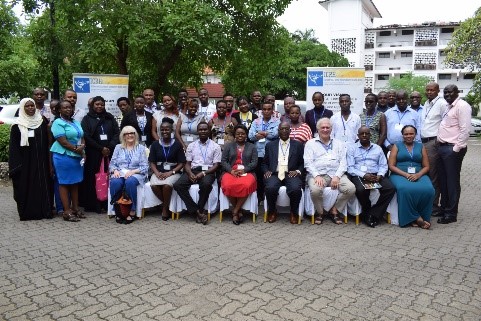 According to a study released by ICRHK on 17 April in Mombasa, many sex workers in Mombasa County lack awareness and knowledge on Pre-exposure prophylaxis (PrEP) and Post-exposure prophylaxis, key HIV prevention strategies. According to a study released by ICRHK on 17 April in Mombasa, many sex workers in Mombasa County lack awareness and knowledge on Pre-exposure prophylaxis (PrEP) and Post-exposure prophylaxis, key HIV prevention strategies.
‘Based on an analysis of in-depth interviews with 21 female and 23 male HIV-negative sex workers in Mombasa, we found that awareness and knowledge of PrEP and PEP strategies was low, although willingness to use both was high’ said Prof. Peter Gichangi, ICRH Country Director, speaking at the event. The sex workers felt PrEP would empower them by offering them added protection against HIV infection.
The study suggests the importance of situating biomedical prevention methods within sex worker–friendly venues like bars, as a majority of sex workers value the confidentiality, privacy, trustworthiness, and convenience of location.
Dr. Jeanne Patrick (Ministry of Health Kenya) noted the importance of such evidence-based studies as they would assist the National Government in making informed HIV prevention policies and interventions.
The study was carried out over a 7-month period between October 2016 and April 2017 in Mombasa County and was dubbed the Boresha Project. One of the main aims of Boresha study was to give a clear understanding of HIV prevention needs among the key population.
The study was led by Prof. Peter Gichangi and Prof. Joanne Mantell from the HIV Center for Clinical and Behavioral Studies at the New York State Psychiatric Institute and Columbia University with support from ICRHK, ICRHB, peer educators and the County Government of Mombasa. It was funded by the US National Institute of Mental Health. |
PMA2020 nutrition survey
ICRHK trains enumerators for round two of PMA2020/Kenya nutrition survey 23 April – 2 May.
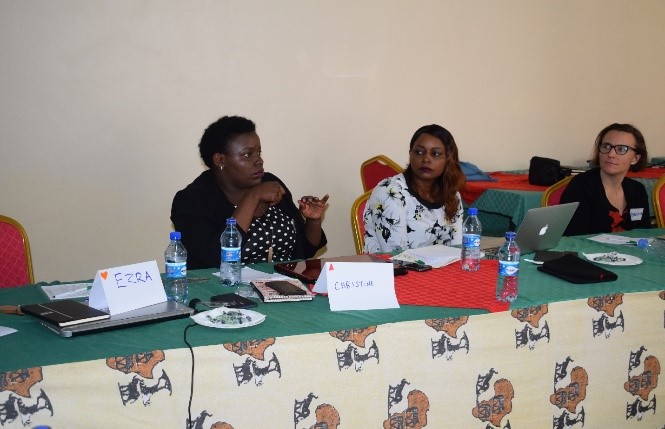 ICRHK in collaboration with Bill & Melinda Gates Institute for Population and Reproductive Health at the Johns Hopkins Bloomberg School of Public Health have organized a 10 day training to prepare Kenya’s resident enumerators coordinators and resident enumerators to collect high quality data for the second round of the PMA-Nutrition survey. ICRHK in collaboration with Bill & Melinda Gates Institute for Population and Reproductive Health at the Johns Hopkins Bloomberg School of Public Health have organized a 10 day training to prepare Kenya’s resident enumerators coordinators and resident enumerators to collect high quality data for the second round of the PMA-Nutrition survey.
The training covered master survey content and questions, how to conduct survey interviews and how to use Open Data Kit (ODK) installed on a smart phone. It also involved comprehensive presentations, demonstrations and mock interviews to familiarize the participants with what they will encounter in the field.
‘As PMA2020/Kenya we always endeavor to produce quality data that will inform policies and interventions in our country. Trainings like this one are very important because they not only provide the enumerators with content on the subject matter but also give them a chance to practice how to capture and submit data before they go back to their communities to collect the actual data’ says Mary Thiongo, ICRHK. PMA2020/Kenya, Technical Advisor.
The PMA2020 Nutrition survey rapidly generate actionable data on nutrition interventions at the national level in Kenya. PMA2020/Kenya is led by the Ministry of Health in collaboration with ICRHK, National Council for Population and Development, and Kenya National Bureau of Statistics. Overall direction and support is provided by Bill & Melinda Gates Institute for Population and Reproductive Health at the Johns Hopkins Bloomberg School of Public Health. The survey is funded by Bill & Melinda Gates Foundation. |
| EVENTS |
Tshingua Course
2nd edition of one-week course for Tsinghua incoming students.
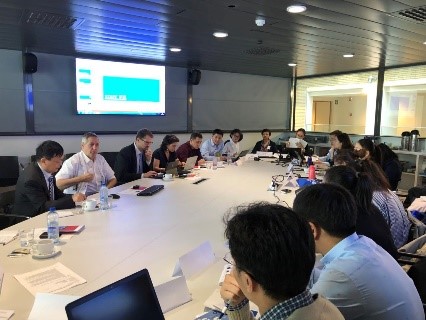 Following the successful first edition of a one-week course for incoming students of Tsinghua University last year, the second edition has been held between 23 and 27 April 2018 Gent, Belgium. The course participants are part-time students in Tsinghua University’s Master of Public Health programme, but at the same time active as governmental officials, leaders of public services, senior administrative personnel of health institution or senior manager of hospitals. This one-week course was composed of teaching and field visits focused on Sexual and Reproductive Health; Ageing Population Care; Patient Rights and HealthCare policy, Nutrition, Intercultural Communication and Management. In addition, there was a visit to the Mission of the People's Republic of China to the EC and a one-day workshop in Genomic Medicine. Following the successful first edition of a one-week course for incoming students of Tsinghua University last year, the second edition has been held between 23 and 27 April 2018 Gent, Belgium. The course participants are part-time students in Tsinghua University’s Master of Public Health programme, but at the same time active as governmental officials, leaders of public services, senior administrative personnel of health institution or senior manager of hospitals. This one-week course was composed of teaching and field visits focused on Sexual and Reproductive Health; Ageing Population Care; Patient Rights and HealthCare policy, Nutrition, Intercultural Communication and Management. In addition, there was a visit to the Mission of the People's Republic of China to the EC and a one-day workshop in Genomic Medicine. |
ICRH Kenya awarded for assistance to victims of sexual and gender based violence
ICRH Kenya has been awarded a trophy of recognition by the County Government of Mombasa for championing provision of medico-legal assistance to victims of sexual and gender based violence in the county.
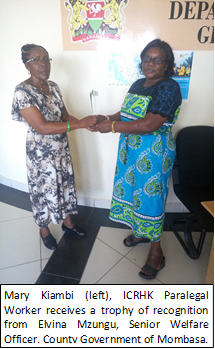 The award ceremony took place during this year’s International women’s day celebration held on March 8, 2018 at Sarova Whitesands Resort in Mombasa. The County Government of Mombasa’s Senior Welfare Officer, Elvina Mzungu, said: ‘As the County Government of Mombasa we recognize and thank ICRH Kenya for the great work it is doing in creating awareness on gender based violence in this county. Through ICRHK interventions many victims of sexual and gender based violence in this county have gotten medical care and legal support’. Elvina added that the county government looks forward for continued partnership with ICRHK in curbing sexual and gender based violence that is rampant in the county. Sexual and gender based violence remains a big challenge in the county due to drug and substance abuse. This is coupled by the culture of silence, apathy and speaking in hushed tones that is characteristic when dealing with sexual and gender based violence within the family, community and other institutions in the county. Lack of knowledge of sexual and gender based violence related issues like location of the services or even knowledge of the existence of such services remains another challenge in the county. ICRHK has intervened by setting up a Gender Based Violence Recovery Centre (GBVRC) at Coast Provincial General Hospital. The post rape care centre provides 24 hour comprehensive medical treatment and legal assistance for survivors of rape, sexual violence and sexual exploitation in the county. The award ceremony took place during this year’s International women’s day celebration held on March 8, 2018 at Sarova Whitesands Resort in Mombasa. The County Government of Mombasa’s Senior Welfare Officer, Elvina Mzungu, said: ‘As the County Government of Mombasa we recognize and thank ICRH Kenya for the great work it is doing in creating awareness on gender based violence in this county. Through ICRHK interventions many victims of sexual and gender based violence in this county have gotten medical care and legal support’. Elvina added that the county government looks forward for continued partnership with ICRHK in curbing sexual and gender based violence that is rampant in the county. Sexual and gender based violence remains a big challenge in the county due to drug and substance abuse. This is coupled by the culture of silence, apathy and speaking in hushed tones that is characteristic when dealing with sexual and gender based violence within the family, community and other institutions in the county. Lack of knowledge of sexual and gender based violence related issues like location of the services or even knowledge of the existence of such services remains another challenge in the county. ICRHK has intervened by setting up a Gender Based Violence Recovery Centre (GBVRC) at Coast Provincial General Hospital. The post rape care centre provides 24 hour comprehensive medical treatment and legal assistance for survivors of rape, sexual violence and sexual exploitation in the county.
Mary Kiambi, a paralegal worker at the GBVRC notes that, ‘I normally visit gender based violence survivors at their homes or hold meetings with them in chief barazas to talk to them on how to seek medical treatment and legal justice. We work closely with partners like the county government in tracking these survivors’. |
Zanzu Network Day
On 19 June, Sensoa and ICRH are organising a network day for professionals in the social profit sector who work with migrants.
This year’s topic is sexual violence against refugees and other migrants. Research by Ines Keygnaerts (ICRH) indicated about 10 years ago that 40% of migrants reported to be victim of sexual and gender based violence in Belgium or the Netherlands, and 35% know someone dear to them who was a victim. The network day aims to give an update on what happened in the field of prevention of sexual violence and care for victims since that research, to exchange good practices and to have in-depth discussions on implementation of those practices in parallel sessions.
For Information and registration please refer to the webpage. |
Marleen Temmerman receives the Van Acker Award
On 29 April ICRH Global chair Prof Marleen Temmerman received the prestigious Van Acker Award.
 The Van Acker Foundation was established in honour of Achiel Van Acker (8 April 1898 – 10 July 1975), former Belgian prime minister and president of the House of Parliament, and his son Frank, the former mayor of Bruges. The Van Acker Foundation was established in honour of Achiel Van Acker (8 April 1898 – 10 July 1975), former Belgian prime minister and president of the House of Parliament, and his son Frank, the former mayor of Bruges.
The biennial Van Acker award is granted to a societally committed person or organization. Marleen was awarded for her lifelong achievements as gynaecologist, scientist, politician and activist. The Van Acker Foundation praised specifically her extraordinary energy and continuous efforts in thinking and doing to pursue her principles and realize her goals. |
PEOPLE |
Sonia Menon  On 23 April, Sonia Menon defended her PhD thesis at Ghent University. On 23 April, Sonia Menon defended her PhD thesis at Ghent University.
The title of the thesis is ‘Cervical cancer prevention in HIV-infected women within a high bacterial vaginosis setting in Kenya’
Supervisors were prof. Davy Vanden Broeck and prof. Steven Callens.
The thesis can be downloaded at the ICRH website.
|
PUBLICATIONS |
Female genital cutting
Health sector involvement in the management of female genital mutilation/cutting in 30 countries
The full text is available at https://www.sciencedirect.com/science/article/pii/S2214109X18300743
For the last decades, the international community has emphasised the importance of a multisectoral approach to tackle female genital mutilation (FGM/C). While considerable improvement concerning legislations and community involvement is reported, little is known about the involvement of the health sector. A mixed methods approach was employed to map the involvement of the health sector in the management of FGM/C both in countries where FGM/C is a traditional practice (countries of origin), and countries where FGM/C is practiced mainly by migrant populations (countries of migration). Data was collected in 2016 using a pilot-tested questionnaire from 30 countries (11 countries of origin and 19 countries of migration). In 2017, interviews were conducted to check for data accuracy and to request relevant explanations. Qualitative data was used to elucidate the quantitative data.
A total of 24 countries had a policy on FGM/C, of which 19 had assigned coordination bodies and 20 had partially or fully implemented the plans. Nevertheless, allocation of funding and incorporation of monitoring and evaluation systems was lacking in 11 and 13 of these countries respectively. The level of the health sectors’ involvement varied considerably across and within countries. Systematic training of healthcare providers (HCP) was more prevalent in countries of origin, whereas involvement of HCP in the prevention of FGM/C was more prevalent in countries of migration. Most countries reported to forbid HCP from conducting FGM/C on both minors and adults, but not consistently forbidding re-infibulation. Availability of healthcare services for girls and women with FGM/C related complications also varied between countries dependent on the type of services. Deinfibulation was available in almost all countries, while clitoral reconstruction and psychological and sexual counselling were available predominantly in countries of migration and then in less than half the countries. Finally, systematic recording of FGM/C in medical records was completely lacking in countries of origin and very limited in countries of migration.
The authors conclude that substantial progress has been made in the involvement of the health sector in both the treatment and prevention of FGM/C. Still, there are several areas in need for improvement, particularly monitoring and evaluation.
R. Elise B. Johansen, Mai Mahgoub Ziyada, Bettina Shell-Duncan, Adriana Marcusàn Kaplan and Els Leye. Health sector involvement in the management of female genital mutilation/cutting in 30 countries. BMC Health Services Research (2018) 18:240.
Full tekst: http://rdcu.be/Kz5j |
Systemic lupus erythematosus
Pregnancy outcomes among Chinese women with and without systemic lupus erythematosus: a retrospective cohort study.
The objective of the study was to completely and quantifiably determine the effect of systemic lupus erythematosus (SLE) on pregnancy outcomes in a Chinese cohort. Data were collected at a tertiary medical centre located in Shanghai, China, from September 2011 to May 2017.
The researchers assigned 338 pregnant women with SLE to the study cohort and 1014 randomly selected pregnant women without SLE (three for every woman with SLE) to a comparison cohort. The relevant medical records of all pregnant women were retrospectively reviewed. Cases of multiple pregnancy and cases in which an artificial abortion was performed for personal reasons were excluded. Maternal and fetal outcomes were primary outcomes, and management of antenatal care was the secondary outcome.
The risks of pregnancy-induced hypertension (OR 2.68, 95% CI 1.75 to 4.09), pre-eclampsia (OR 3.13, 95% CI 1.95 to 5.03) and premature rupture of membranes (OR 2.53, 95% CI 1.46 to 4.40) were significantly different between women with and without SLE. Gestational diabetes was negatively associated with SLE in pregnant women (OR 0.49, 95% CI 0.28 to 0.85). Pregnant women with SLE displayed significantly higher rates of fetal loss (OR 10.23, 95% CI 5.08 to 20.59), including spontaneous abortion (OR 4.42, 95% CI 1.52 to 12.80), therapeutic abortion (OR 16.57, 95% CI 5.80 to 47.35) and stillbirth (OR 13.25, 95% CI 1.49 to 118.11), and a higher risk of preterm birth (OR 3.15, 95% CI 2.21 to 4.50), intrauterine growth restriction (OR 2.20, 95% CI 1.35 to 3.58), a child who was small for the gestational age (OR 1.86, 95% CI 1.11 to 3.13), a caesarean section (OR 4.73, 95% CI 3.30 to 6.80) or a neonatal intensive care unit admission (OR 3.48, 95% CI 2.21 to 5.48) than women in the non-SLE population after adjusting for confounding factors.
The authors conclude that in this study, SLE significantly increased the risk of adverse pregnancy outcomes. Therefore, a preconception assessment and close antenatal monitoring by both rheumatologists and obstetricians should be performed in pregnant women with SLE.
Wu J, Ma J, Bao C, Di W, Zhang WH6.Pregnancy outcomes among Chinese women with and without systemic lupus erythematosus: a retrospective cohort study. BMJ Open. 2018 Apr 13;8(4):e020909. doi: 10.1136/bmjopen-2017-020909. |
Female sex workers and SRH services
A mixed-methods implementation study on impact of a ‘diagonal’ intervention on uptake of sexual and reproductive health services by female sex workers in Mozambique:
Female sex workers (FSWs) have high risks for adverse sexual and reproductive health (SRH) outcomes, yet low access to services. Within an implementation research project enhancing uptake of SRH services by FSWs, the researchers piloted a ‘diagonal’ intervention, which combined strengthening of FSW-targeted services (vertical) with making public health facilities more FSW-friendly (horizontal), and tested its effect.
The study applied a convergent parallel mixed-methods design to assess changes in access to SRH services. Results of structured interviews with FSWs pre-intervention (N = 311) and thereafter (N = 404) were compared with the findings of eight post-intervention focus group discussions (FGDs) with FSWs and two with FSW-peer educators (PEs). Marked and statistically significant rises occurred in consistent condom use with all partners (55.3–67.7%), ever use of female condoms (37.9–54.5%), being tested for HIV in the past 6 months (56.0–76.6%), using contraception (84.5–95.4%), ever screened for cervical cancer (0.0–16.9%) and having ≥10 contacts with a PE in the past year (0.5–24.45%). Increases mostly resulted from FSW-targeted outreach, with no rise detected in utilization of public health facilities. FGD participants reported that some facilities had become more FSW-friendly, but barriers such as stock-outs, being asked for bribes and disrespectful treatment persisted.
The authors conclude that the combination of expanding FSW-targeted SRH services with improving access to the public health services resulted in an overall increased uptake of services, but almost exclusively because of the strengthened targeted (vertical) outreach services. Utilization of public SRH services had not yet increased and many barriers to access remained. The diagonal approach was thus only successful in its vertical component. Improving access to the general health services remains nevertheless important and further research is needed how to reduce barriers. Ideally, the combination approach should be maintained and more successful approaches to increase utilization of public services should be explored.
Yves Lafort, Faustino Lessitala, Malica Sofia Ismael de Melo, Sally Griffin, Matthew Chersich and Wim Delva. Impact of a “Diagonal” Intervention on Uptake of Sexual and Reproductive Health Services by Female Sex Workers in Mozambique: A Mixed-Methods Implementation Study.
Front Public Health, 18 April 2018 | https://doi.org/10.3389/fpubh.2018.00109 |
|
|
| |
|
|
 ICRH Global Newsletter
ICRH Global Newsletter 

 The World Health Day is a global health awareness day celebrated every year on 7 April, under the sponsorship of the World Health Organization, as well as other related organisations. Environment, peace, health, immunization, gender, SRHR... are all subjects of universal concern to the people of this world, and so is universal health coverage, this year’s World Health Day theme. ICRH, a WHO collaborating centre on sexual and reproductive health is a strong partner of the global SDG community striving towards more health, rights, equity and agency for women and children.
The World Health Day is a global health awareness day celebrated every year on 7 April, under the sponsorship of the World Health Organization, as well as other related organisations. Environment, peace, health, immunization, gender, SRHR... are all subjects of universal concern to the people of this world, and so is universal health coverage, this year’s World Health Day theme. ICRH, a WHO collaborating centre on sexual and reproductive health is a strong partner of the global SDG community striving towards more health, rights, equity and agency for women and children. The first workshop was at Maanzoni Lodge, Machakos County and the second one at StarBuck’S Hotel, Uasin Gishu County.
The first workshop was at Maanzoni Lodge, Machakos County and the second one at StarBuck’S Hotel, Uasin Gishu County. According to a study released by ICRHK on 17 April in Mombasa, many sex workers in Mombasa County lack awareness and knowledge on Pre-exposure prophylaxis (PrEP) and Post-exposure prophylaxis, key HIV prevention strategies.
According to a study released by ICRHK on 17 April in Mombasa, many sex workers in Mombasa County lack awareness and knowledge on Pre-exposure prophylaxis (PrEP) and Post-exposure prophylaxis, key HIV prevention strategies. ICRHK in collaboration with Bill & Melinda Gates Institute for Population and Reproductive Health at the Johns Hopkins Bloomberg School of Public Health have organized a 10 day training to prepare Kenya’s resident enumerators coordinators and resident enumerators to collect high quality data for the second round of the PMA-Nutrition survey.
ICRHK in collaboration with Bill & Melinda Gates Institute for Population and Reproductive Health at the Johns Hopkins Bloomberg School of Public Health have organized a 10 day training to prepare Kenya’s resident enumerators coordinators and resident enumerators to collect high quality data for the second round of the PMA-Nutrition survey. Following the successful first edition of a one-week course for incoming students of Tsinghua University last year, the second edition has been held between 23 and 27 April 2018 Gent, Belgium. The course participants are part-time students in Tsinghua University’s Master of Public Health programme, but at the same time active as governmental officials, leaders of public services, senior administrative personnel of health institution or senior manager of hospitals. This one-week course was composed of teaching and field visits focused on Sexual and Reproductive Health; Ageing Population Care; Patient Rights and HealthCare policy, Nutrition, Intercultural Communication and Management. In addition, there was a visit to the Mission of the People's Republic of China to the EC and a one-day workshop in Genomic Medicine.
Following the successful first edition of a one-week course for incoming students of Tsinghua University last year, the second edition has been held between 23 and 27 April 2018 Gent, Belgium. The course participants are part-time students in Tsinghua University’s Master of Public Health programme, but at the same time active as governmental officials, leaders of public services, senior administrative personnel of health institution or senior manager of hospitals. This one-week course was composed of teaching and field visits focused on Sexual and Reproductive Health; Ageing Population Care; Patient Rights and HealthCare policy, Nutrition, Intercultural Communication and Management. In addition, there was a visit to the Mission of the People's Republic of China to the EC and a one-day workshop in Genomic Medicine. The award ceremony took place during this year’s International women’s day celebration held on March 8, 2018 at Sarova Whitesands Resort in Mombasa. The County Government of Mombasa’s Senior Welfare Officer, Elvina Mzungu, said: ‘As the County Government of Mombasa we recognize and thank ICRH Kenya for the great work it is doing in creating awareness on gender based violence in this county. Through ICRHK interventions many victims of sexual and gender based violence in this county have gotten medical care and legal support’. Elvina added that the county government looks forward for continued partnership with ICRHK in curbing sexual and gender based violence that is rampant in the county. Sexual and gender based violence remains a big challenge in the county due to drug and substance abuse. This is coupled by the culture of silence, apathy and speaking in hushed tones that is characteristic when dealing with sexual and gender based violence within the family, community and other institutions in the county. Lack of knowledge of sexual and gender based violence related issues like location of the services or even knowledge of the existence of such services remains another challenge in the county. ICRHK has intervened by setting up a Gender Based Violence Recovery Centre (GBVRC) at Coast Provincial General Hospital. The post rape care centre provides 24 hour comprehensive medical treatment and legal assistance for survivors of rape, sexual violence and sexual exploitation in the county.
The award ceremony took place during this year’s International women’s day celebration held on March 8, 2018 at Sarova Whitesands Resort in Mombasa. The County Government of Mombasa’s Senior Welfare Officer, Elvina Mzungu, said: ‘As the County Government of Mombasa we recognize and thank ICRH Kenya for the great work it is doing in creating awareness on gender based violence in this county. Through ICRHK interventions many victims of sexual and gender based violence in this county have gotten medical care and legal support’. Elvina added that the county government looks forward for continued partnership with ICRHK in curbing sexual and gender based violence that is rampant in the county. Sexual and gender based violence remains a big challenge in the county due to drug and substance abuse. This is coupled by the culture of silence, apathy and speaking in hushed tones that is characteristic when dealing with sexual and gender based violence within the family, community and other institutions in the county. Lack of knowledge of sexual and gender based violence related issues like location of the services or even knowledge of the existence of such services remains another challenge in the county. ICRHK has intervened by setting up a Gender Based Violence Recovery Centre (GBVRC) at Coast Provincial General Hospital. The post rape care centre provides 24 hour comprehensive medical treatment and legal assistance for survivors of rape, sexual violence and sexual exploitation in the county. The Van Acker Foundation was established in honour of Achiel Van Acker (8 April 1898 – 10 July 1975), former Belgian prime minister and president of the House of Parliament, and his son Frank, the former mayor of Bruges.
The Van Acker Foundation was established in honour of Achiel Van Acker (8 April 1898 – 10 July 1975), former Belgian prime minister and president of the House of Parliament, and his son Frank, the former mayor of Bruges. On 23 April, Sonia Menon defended her PhD thesis at Ghent University.
On 23 April, Sonia Menon defended her PhD thesis at Ghent University.